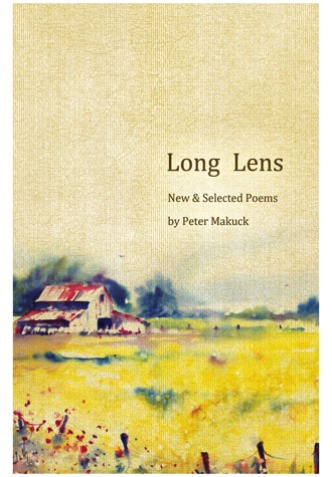Long Lens
Makuck has one of the finest eyes for detail in contemporary poetry . . . the title poem . . . displays the poet’s visual skills and his sure handling of narrative
R.S. Gwynn, The Hudson Review
There is an easy, unforced mastery and grace in Makuck’s poetry. His poems always take exactly the right approach and find the right tone, never making too much or too little of their subject matter. Makuck is a master of transitions, often cutting between past and present scenes seamlessly . . . . What’s extraordinary is the way these poems, time after time, lift ordinary events into moments in which we come to know our lives, both in terms of the painful connections that link us to one another and those grace moments which give our lives substance and meaning
Robert Cording, The Anglican Theological Review
Peter Makuck’s Long Lens: New & Selected Poems providesfour decades of work that show continuity and cohesiveness yet with a sensibility open to surprise. He knows his process to the bone, the apprehension of objects, their energy moving through the senses, then the imagination ordering a consideration of them . . . . [This book] abounds in examples of how the right moves with perspective are acts of attentiveness by which a poem’s design springs from underfoot, with a reach that can take in worlds
Thomas Reiter, The Hollins Critic
The ‘long lens” of the title poem is not simply the objectivity of the long view—appropriate for a New & Selected (and yet it is that too) but the reach of emotional attentiveness . . . . The easy-going manner of many of these poems should not blinker us to the fact that they are also polished and load-bearing when they seem least to be. Long Lens, in fact, is as accomplished for what it doesn’t do, as for what it does: it reaches for depths without succumbing to the usual sonorities of gravitas; it radiates feeling—the from-the-beyond feeling of absence (so closely tied to desire) and the (necessary) pity of closure, without becoming sentimental; it’s formally adroit without being arty, and its manner invites the reader without manipulation. Makuck’s poems have long been favorites of mine, and I hope his new and selected will bring him to the attention of a new audience who wouldn’t mind being shown, now and then, how it’s done.
David Rigsbee, The Courtland Review
Makuck is adept at both the short lyric and longer narrative pieces . . . . His poems travel the world—Spain, France, the Andes Mountains—but his obvious passion for the people and places of the Carolina coast make those poems, and there are many of them in this collection, his strongest work. Long Lens shows that over nearly four decades Peter Makuck has ridden the water toa pretty high mark. Let’s hope he’s not through sailing yet
Michael Chitwood, News & Observer
Long Lens represents some thirty years of Peter Makuck’s work. “Roofers,” near the middle of the collection, ends with this: “l watch what comes into view / always eager for the small good thing / that happens next.” There are many small good things throughout the collection, opening always onto the larger, almost unsayable thing. In “After,” the speaker tells the story of driving past a small domestic scene, ordinary and tender, a Mexican woman cutting her husband’s hair outside—after a seemingly irredeemable visit to a cemetery. The speaker eases the car ahead a little at the light until everyone in the car can see the scene. The poem ends, “Before we left that crossroads / with whatever it was we needed, the light went green / two or three times, I think.” In “Dusk Watch,” friends gathered together after a death sight a flock of pelicans, “one of his favorites,” the wife tells them. “Then, / as if called, one bird / left the cortège and returned, / turned tightly over the roof / four or five times, // the last an eye-level pass / before he angled off / to follow the long dark line. // We looked at each other / and finally laughed, Gerda too, / her eyes wide and wet.” Long Lens brings just such moments into view over and over. The moments may be small and highly missable, but these poems reveal them as the vehicles by which something even greater than human love tries to make sure that we have what we need
Diane Gilliam, Judge of the Brockman-Campbell Award for the best book of poetry published by a North Carolinian in 2011
